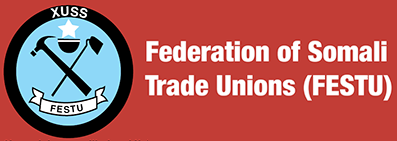In the last two years, Somalia has made impressive strides at a macro-economic level, including qualifying for debt relief, engaging more fully with the international community and finalising the country’s National Development Plan 9. However, the high levels of unemployment, grinding poverty and widening inequality are evidence of pervasive human rights violations. Somalia must face up and respond to these challenges in holistic, transparent and sustainable ways.
According to the World Bank, the international poverty rate is projected at 71% and likely to remain at this level in 2022 and 2023. On the ground, this translates to ordinary Somalis struggling to secure three nutritious meals a day, provide basic security for their families and enjoy lives characterised by choice, dignity and freedom. In 2021, it is clear that human rights are still a big challenge, particularly for the largest proportion of the population – workers.
Human rights violation are perhaps nowhere more evident than in working relationships in Somalia. Vulnerable workers face severe and continued exploitation, poor working conditions and insecure futures. Ruthless employers still pay poverty wages, summarily dismiss workers, and disregard their duty of care. As a national organisation, the Federation of Somali Trade Unions (FESTU) is intimately familiar with the varied struggles faced by many workers being denied their human and labour rights.
Insult is further added to injury as many of these human rights abuses against workers are carried out within Somalia’s culture of impunity. This, despite the fact that the Constitution guarantees fundamental and indivisible rights of freedom of association, the right to bargain collectively and the right to be represented by a trade union.
Recognising that workers are not a homogenous groups, FESTU is aware that young people, women and foreign nationals experience human rights violations in particular ways because of their social identities and vulnerable positions in society.
It is no coincidence that today marks the end of the global campaign, the 16 Days of Activism against Gender-Based Violence (GBV). Somalia is still plagued with high levels of GBV and violence against children which remain a stain and an embarrassment on our country’s performance and democracy efforts. Within the workplace, women workers face discrimination, abuse, exploitation and various forms of harassment. We call on the Federal Government of Somalia to domesticate and effectively implement ILO convention 190 on violence and harassment to end abuses against women in the workplace.
One this International Human Rights Day, we place the spotlight on a case that has long revealed the entrenched culture of violation and impunity existing in the Somalia labour landscape. The rights of workers employed by FAVORI LLC at Mogadishu’s Aden Adde International Airport have been routinely and grossly violated. For too long, FAVORI LLC has been denying its Mogadishu airport workers, especially Somali nationals, their fundamental labour rights as guaranteed by both Somali and Turkish laws. This company does not dare to exercise these horrendous practices in Turkey because of the strong labour laws and effective law enforcement mechanisms in that country.
The FAVORI LLC case has not only revealed how little the lives and rights of workers mean to some employers, but the culture of impunity that exists as the company was able to carry out these acts under the shield of unscrupulous Somali politicians.
FESTU has kept up sustained advocacy against the actions of FAVORI LLC and we continue to call for the company to stop defying court orders and comply with national and international labour standards. Our Provisional Constitution has made it very clear that human rights are a priority for Somalia. However, poor implementation makes this a commitment on paper but not a reality for millions of people who reside in Somalia. This needs to unequivocally change. We need to commit to a coordinated, robust and sustainable strategy to realising human rights for all in Somalia.
